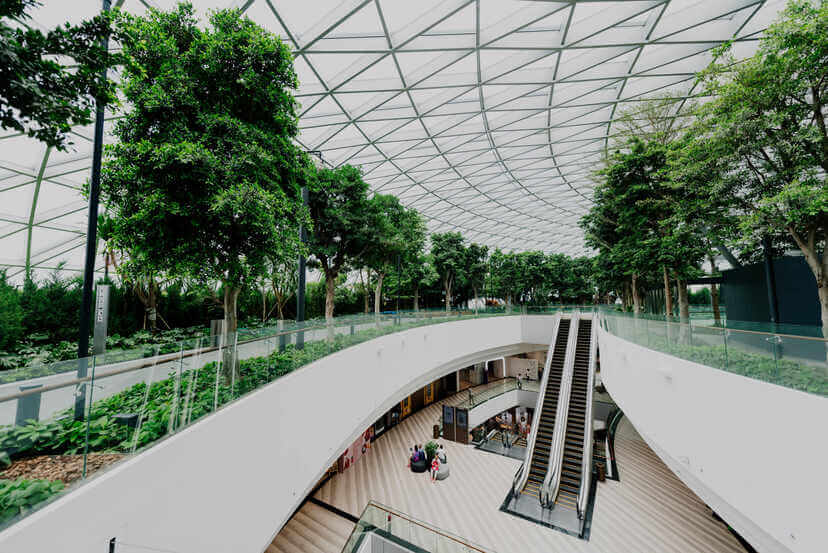The Future of Sustainable Construction

The construction industry stands at a pivotal juncture as the need for sustainability intersects with rapid infrastructural development. As global challenges like climate change and resource depletion intensify, the adoption of sustainable construction practices has transitioned from being a mere option to an absolute necessity.
In this context, infrastructure (Infra) development and Public Sector Undertakings (PSUs) play a crucial role in steering the industry towards a more sustainable future.
The Imperative for Sustainable Construction
Sustainable construction, often synonymous with ‘green building,’ refers to the practice of creating structures that are environmentally responsible and resource-efficient throughout their lifecycle—from design and construction to operation, maintenance, and deconstruction.This approach not only reduces environmental harm but also improves occupants’ health and well-being.
In India, the significance of sustainable construction is underscored by the nation’s ranking as second globally, just after the United States, in terms of the number of green technology projects and built-up area.
The Role of Infrastructure in Sustainable Development
A nation’s development heavily relies on robust infrastructure, including transportation systems, energy networks, water supply, and waste management. The quality and sustainability of infrastructure directly influence a country’s economic growth, social equity, and environmental health. Investing in sustainable infrastructure is key to meeting current development needs while safeguarding resources for future generations.
In India, the construction industry is on a trajectory of significant growth, with projections estimating it to reach a staggering $1.4 trillion by 2025. This surge presents both an opportunity and a responsibility to integrate sustainable practices that can lead to resilient and eco-friendly infrastructure.
Public Sector Undertakings (PSUs): Catalysts for Sustainable Practices
Public Sector Undertakings (PSUs) in India have long played a key role in industrial and infrastructural development. Given their substantial influence and resources, PSUs are uniquely positioned to lead the transition towards sustainable construction practices. By integrating sustainability into their operational ethos, PSUs can set benchmarks for the private sector and ensure that large-scale projects adhere to environmental standards.
For instance, Indian Railways, one of the largest PSUs, has been actively pursuing sustainability initiatives, including electrification of routes, water conservation measures, and the adoption of renewable energy sources. These initiatives not only lower carbon footprints but also enhance resource efficiency, encouraging adoption across industries.
Emerging Trends in Sustainable Construction
Several innovative trends are shaping the future of sustainable construction by reducing environmental impact and improving efficiency:
- Use of Sustainable Materials: The shift towards materials like bamboo, fly ash bricks, recycled plastics, and bio-based products is gaining momentum. These materials offer superior insulation, lower carbon footprints, and reduced waste generation, making them ideal for sustainable construction.
- Energy-Efficient Building Designs: Incorporating designs that maximize natural light and ventilation, coupled with energy-efficient systems, significantly reduces a building’s energy consumption. This approach not only lowers operational costs but also minimizes environmental impact.
- Water Conservation Techniques: Implementing rainwater harvesting, wastewater recycling, and low-flow fixtures ensures the sustainable use of water resources, addressing the critical issue of water scarcity.
- Green Roofing and Vertical Gardens: These features enhance urban biodiversity, improve air quality, and provide natural insulation, contributing to the overall sustainability of urban environments.
- Smart Building Technologies: Integrating IoT devices enables real-time energy monitoring and optimization, improving sustainability.
Challenges and the Way Forward
Despite its clear benefits and rising adoption, sustainable construction still faces key challenges:
- Higher Initial Costs: Sustainable materials and technologies often require larger upfront investments, which may deter short-term-focused stakeholders.
- Lack of Awareness and Expertise: There remains a knowledge gap among builders, architects, and consumers regarding sustainable practices and their long-term benefits.
- Regulatory Hurdles: Inconsistent enforcement of environmental regulations can lead to the proliferation of unsustainable construction practices.
Addressing these challenges requires a multifaceted approach:
- Policy Interventions: Governments must implement and enforce policies that incentivize sustainable practices, such as tax breaks, subsidies, and expedited approvals for green projects.
- Capacity Building: Educational programs and professional training can equip stakeholders with the necessary skills and knowledge to implement sustainable practices effectively.
- Public-Private Partnerships: Collaborations between government entities and private firms can drive large-scale sustainable projects, sharing risks and benefits to promote broader adoption.
The Role of Moglix Business in Sustainable Fabrication
Moglix Business demonstrates a strong commitment to sustainability in fabrication. By offering a single-window solution for the design-build-delivery journey of fabrication projects, Moglix ensures that enterprises can access sustainable and efficient fabrication services.
The capabilities span from design engineering to onsite erection, all underpinned by a robust quality assurance framework. Notably, Moglix’s involvement in projects of national importance, such as India’s first bullet train corridor, showcases their commitment to advancing sustainable infrastructure.
Conclusion
The future of sustainable construction hinges on the collective efforts of all stakeholders, with infrastructure development and PSUs playing pivotal roles. By embracing sustainable materials, innovative technologies, and forward-thinking policies, the construction industry can build a future that harmonizes development with environmental stewardship. Companies like Moglix Business are leading the charge, demonstrating that sustainable practices are not just viable but essential in shaping a resilient and prosperous future.
Interested in sustainable construction solutions?
Contact us at info@moglixbusiness.com to explore customized options.
